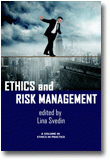
Ethics and Risk Management
Edited by:
Lina Svedin, University of Utah
A volume in the series: Ethics in Practice. Editor(s): Robert A. Giacalone, Texas State University. Carole L. Jurkiewicz, University of Colorado, Colorado Springs.
Published 2015
The underlying rationale for this book is to present research that a) highlights the explosively political and deeply divisive issues involved in managing risk and b) address the empirical deficit and theoretical challenges related to managing societal risk ethically. Extant risk management research borrows heavily from engineering, systems theory and business management, and is primarily focused on probabilities, modeling, and abstractions of the value of mitigative action. This research engenders a false sense of objectivity and it de-politicizes fundamental political and democratic questions about the allocation of society’s scarce resources and about the balance of responsibilities between governing institutions and individuals with regard to risk. The quantitative and hard-science focus on risk also keeps a discussion of the consequences of the distribution of risk, resources and responsibilities for real people out of the lime light. The contributors to this book are experts in a wide range of academic fields and in this book they take on the challenge of examining their core research with a specific ethics perspective. They explore the ethics of risk management using theory, cases and data from a range of policy areas, countries and philosophical traditions.
This book should be of interest to scholars and practitioners working in fields that deal either implicitly or explicitly with risk. This would include, but is not limited to, scholars and students of public management, public sector ethics, public policy, risk regulation, and risk management. The book deals directly with core problems of management in the public sector, value-conflicts, multiple principals and stakeholders, as well as information analysis and the application of sound and valid decision-making processes. The book can be adopted as a core text for graduate courses in public management, public policy, public administration ethics, and comparative politics. It would also work well as an applied theory text in comparative politics; ethics centered courses in political science, as well as more narrowly focused courses on risk, crisis and disaster management.
For the practitioner audience, this book pin-points the ethical stakes, the analytical and managerial challenges, and the necessary tools to meet the many risks that societies face. This book, Ethics and Risk Management, provides a unique take on the realities of cost-benefit analysis, efforts to control and regulate risk and risky behavior, as well as the decidedly bounded rationality with which we, as decision-makers and citizens, perceive and take risks. The work of identifying, understanding, prioritizing and designing effective tools to mitigate and manage risk is an inherently analytical and strategic process best suited to take place before and between crises. Successful risk analysis and management reduces the general occurrence of crises, while the ethical analysis and management of risk serves to reduce the likelihood of subsequent socio-political turmoil should a crisis occur. Thus, the investment that any practitioner makes in risk management has the potential to yield both social and political benefits if the analysis and work is done with an eye toward ethics and stakeholder analysis.
CONTENTS
Foreword, Brendon Swedlow. Acknowledgments, Lina Svedin. Introduction, Lina Svedin. The Ethical Value of Risk Reduction: Utilitarianism, Prioritarianism and Cost-Benefit Analysis, Matthew D. Adler. The Ethics of Risk Management in the European Union and The United States: A Comparative Perspective, David Vogel. Risk Management and Conflicts of Interest, Leslie Francis. The Social and Environmental Costs of Energy Development: Risks and Ethical Considerations, Christopher A. Simon. Managing Biomass Risks: Flawed Science, Flawed Ethics, and Flawed Regulations, Kristin Shrader-Frechette. Ethics and Risk Management: The Cultural Perspective, Ásthildur E. Bernharðsdóttir. Civil Society Organiations and Risk Management: The Case of Japan, Aya Okada. Ethical Perspectives on Volunteer Participation: Training CBRN Incidents Live, Erna Danielsson, Erika Wall, and Susanna Öhman. The Ethics of a Global Response to the Governance of Migration, Adam Luedtke. Conclusions, Lina Svedin. About the Authors.
REVIEWS
"The book Ethics and Risk Management focuses on the ethical aspects of risk management and reveals how culture and social values shape risk perceptions and, consequently, the actions that a community takes to mitigate and manage risk. As the book’s editor, Lina Svedin, points out: risk perception is subjective and can be influenced by culture and social context (p. 1). Consequently, societies with different cultures and value systems may perceive risk differently and may have different preferences regarding the policy options used to respond to risk. While the topics of “risk management†and “ethics†are seldom discussed in unison in the field of public affairs, this book explores the linkage between these topics and urges policymakers and public managers to recognize the cultural and social contexts in which they operate and to propose just, fair and appropriate measures when designing policies that seek to mitigate and distribute risk." Dr. Wen-Jiun Wang Sam Houston State University in Journal of Comparative Policy Analysis
-
Paperback978-1-68123-093-1
Web price: $45.04 (Reg. 52.99)
-
Hardcover978-1-68123-094-8
Web price: $80.74 (Reg. 94.99)
- eBook978-1-68123-095-5

- BUS041000 - BUSINESS & ECONOMICS: Management
- BUS008000 - BUSINESS & ECONOMICS: Business Ethics
- BUS071000 - BUSINESS & ECONOMICS: Leadership
-
 Diversity as Strategic Opportunity
Exploring New Paths to Good Administration
Diversity as Strategic Opportunity
Exploring New Paths to Good Administration
-
 Educating in Ethics Across the Professions
A Compendium of Research, Theory, Practice, and an Agenda for the Future
Educating in Ethics Across the Professions
A Compendium of Research, Theory, Practice, and an Agenda for the Future
-
 Ethics and Crisis Management
Ethics and Crisis Management
-
 Ethics Training in Action
An Examination of Issues, Techniques, and Development
Ethics Training in Action
An Examination of Issues, Techniques, and Development
-
 How to Transform Workplace Bullies into Allies
How to Transform Workplace Bullies into Allies
-
 Organizational Ethics and Stakeholder Well-Being in the Business Environment
Organizational Ethics and Stakeholder Well-Being in the Business Environment
-
 Radical Thoughts on Ethical Leadership
Radical Thoughts on Ethical Leadership

